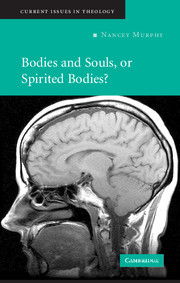Book contents
- Frontmatter
- Contents
- List of figures
- Preface
- 1 Do Christians need souls? Theological and biblical perspectives on human nature
- 2 What does science say about human nature? Physics, evolutionary biology, and neuroscience
- 3 Did my neurons make me do it? Reductionism, morality, and the problem of free will
- 4 What are the philosophical challenges to physicalism? Human distinctiveness, divine action, and personal identity
- Index
3 - Did my neurons make me do it? Reductionism, morality, and the problem of free will
Published online by Cambridge University Press: 05 June 2012
- Frontmatter
- Contents
- List of figures
- Preface
- 1 Do Christians need souls? Theological and biblical perspectives on human nature
- 2 What does science say about human nature? Physics, evolutionary biology, and neuroscience
- 3 Did my neurons make me do it? Reductionism, morality, and the problem of free will
- 4 What are the philosophical challenges to physicalism? Human distinctiveness, divine action, and personal identity
- Index
Summary
Prospect
My two previous chapters have dealt with theories of human nature from the point of view, first, of theology and biblical studies, and second of science. I noted in chapter 1 that within the general population a view of humans as composed of body, soul, and spirit is often the preferred position. Equally popular is dualism, and there are two versions: body and soul or body and mind. Trichotomism and dualism are in conflict with majority views in neuroscience, where some sort of physicalism or materialism is the preferred view. This makes it appear that science and religion are headed for conflict. For example, Nobel-Prize-winning scientist Francis Crick claims to have falsified Christianity by showing that there is no soul. In contrast, I have argued that there is a remarkable convergence here between science and Christian scholarship. Christian scholars began to draw the same conclusion a hundred years ago. In fact, the body–soul dualism in Christian history has been more of an accommodation to culture than distinctive to biblical teaching.
I also pointed out in chapter 1 that there have been a variety of philosophical theories in Western history. In modern philosophy mind–body dualism has been a major contender for three hundred years, from René Descartes to Gilbert Ryle. Since the 1950s, though, the number of dualists has been decreasing and the number of physicalists has been increasing dramatically.
- Type
- Chapter
- Information
- Bodies and Souls, or Spirited Bodies? , pp. 71 - 110Publisher: Cambridge University PressPrint publication year: 2006



